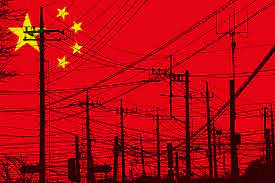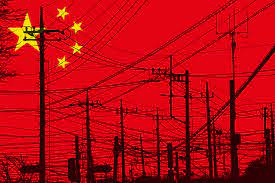
On Friday, the energy crisis in China worsened further as cold weather blanketed a large part of the country while power plants struggled to stockpile coal that pushed up coal prices to new highs.
As strong cold winds blowing down from northern China, demand for more electricity for heating homes and offices is expected to skyrocket this week. Temperatures in some central and eastern regions could drop by as much as 16 degrees Celsius in the next 2-3 days, according to forecasters.
Power shortages have erupted in the world's second-largest economy due to a lack of coal, high fuel prices, and booming post-pandemic industrial demand.
Since September, there has been rationing in effect in at least 17 of mainland China's more than 30 regions, which has forced some factories to temporarily shut down output while supply chains have been disrupted.
Early on Friday, a new high of 1,669.40 yuan ($259.42) per tonne of coal was seen in the most active January Zhengzhou thermal coal futures. So far this year, there has been a more than 200 per cent rise in the contract.
To cope with the colder-than-normal weather, the three north eastern provinces of Jilin, Heilongjiang, and Liaoning, as well as several other regions in northern China, including Inner Mongolia and Gansu, have already begun winter heating, which is primarily powered by coal.
In order to keep coal prices in check, a number of steps have been taken by Chinese authorities that include increasing domestic coal production and curtailing electricity to power-hungry industries and factories during peak demand periods. According to repeated assurances by Beijing, the supply of energy during the winter heating season will be ample.
However, experts and analysts expect the current power shortages to last well into early next year, with then predicting a 12 per cent drop in industrial power consumption in the fourth quarter of the current year because of lower coal supply and priority for energy supply being given to residential users by local governments.
Starting Oct. 15, Beijing said earlier this week that it would allow its coal-fired power prices to fluctuate by up to 20 per cent from base levels which would mean that power generating companies would be able to pass on to commercial and industrial end-users the high generation costs which also marks the most such significant step by Chinese authorities in a decades-long power sector reform.
The new policy is likely to result in higher and more volatile power costs for steel, aluminum, cement, and chemical manufacturers which will then put under pressure profit margins for the industries. Factory-gate inflation in September reached a new high, according to data released on Thursday.
A goal of becoming "carbon neutral" by 2060 has been set by China which has prompted authorities there to try and bring down its reliance on the higher polluting coal power in favor of cleaner wind, solar, and hydropower.
However, it is widely expected that coal will continue to meet the majority of the country's electricity needs for quite some time more.
(Source:www.thehindubusinessline.com)
As strong cold winds blowing down from northern China, demand for more electricity for heating homes and offices is expected to skyrocket this week. Temperatures in some central and eastern regions could drop by as much as 16 degrees Celsius in the next 2-3 days, according to forecasters.
Power shortages have erupted in the world's second-largest economy due to a lack of coal, high fuel prices, and booming post-pandemic industrial demand.
Since September, there has been rationing in effect in at least 17 of mainland China's more than 30 regions, which has forced some factories to temporarily shut down output while supply chains have been disrupted.
Early on Friday, a new high of 1,669.40 yuan ($259.42) per tonne of coal was seen in the most active January Zhengzhou thermal coal futures. So far this year, there has been a more than 200 per cent rise in the contract.
To cope with the colder-than-normal weather, the three north eastern provinces of Jilin, Heilongjiang, and Liaoning, as well as several other regions in northern China, including Inner Mongolia and Gansu, have already begun winter heating, which is primarily powered by coal.
In order to keep coal prices in check, a number of steps have been taken by Chinese authorities that include increasing domestic coal production and curtailing electricity to power-hungry industries and factories during peak demand periods. According to repeated assurances by Beijing, the supply of energy during the winter heating season will be ample.
However, experts and analysts expect the current power shortages to last well into early next year, with then predicting a 12 per cent drop in industrial power consumption in the fourth quarter of the current year because of lower coal supply and priority for energy supply being given to residential users by local governments.
Starting Oct. 15, Beijing said earlier this week that it would allow its coal-fired power prices to fluctuate by up to 20 per cent from base levels which would mean that power generating companies would be able to pass on to commercial and industrial end-users the high generation costs which also marks the most such significant step by Chinese authorities in a decades-long power sector reform.
The new policy is likely to result in higher and more volatile power costs for steel, aluminum, cement, and chemical manufacturers which will then put under pressure profit margins for the industries. Factory-gate inflation in September reached a new high, according to data released on Thursday.
A goal of becoming "carbon neutral" by 2060 has been set by China which has prompted authorities there to try and bring down its reliance on the higher polluting coal power in favor of cleaner wind, solar, and hydropower.
However, it is widely expected that coal will continue to meet the majority of the country's electricity needs for quite some time more.
(Source:www.thehindubusinessline.com)





